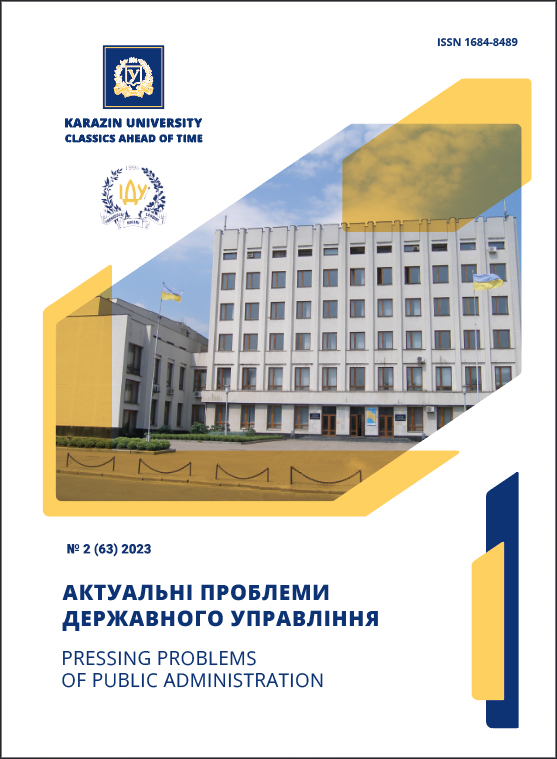Exploring and Acquiring Modern Human Resource Competencies in Cybersecurity Amidst State Digital Transformation
Abstract
This paper validates the relevance of contemporary electronic communication systems, networks, and hardware and software suites and tools being particularly susceptible to cyber influences. The goal of the article is to concisely summarize international experience in modern human resource competencies within the cybersecurity domain and to identify their components according to specific directions.
The paper examines current international trends regarding the formation of a minimal necessary package for creating, implementing, technical support, and enhancing an information security and cyber defense management system. This necessitates the development of a digitally aware society by the state, a crucial area of its internal policy. It emphasizes the undeniable fact that the demand for cybersecurity professionals will continually grow as high-technology society advances. In the context of the state’s total defense, the role of unified training for defense force personnel and the civilian sector in cybersecurity is beyond doubt.
It is concluded that the main focus in forming Cybercom of partner countries is adequate funding, careful selection of personnel, quality professional training, and ensuring full interoperability of diverse structural units of subjects ensuring information protection and cybersecurity at the state level. The share of cyber threats is increasing, and this trend will intensify over the next decade as the internet technology sphere is developing rapidly, and digital solutions are being used in combination (e.g., artificial intelligence and blockchain). For instance, current Russia is one of the main threats to national and international cybersecurity, actively implementing the concept of information confrontation based on a combination of destructive actions in cyberspace. An increase in conflicts between states and the intensity of intelligence and subversive activities in cyberspace is expected. The number of states seeking to form their own cyber-intelligence, master the latest methods of destructive influence in cyberspace, and strengthen state control over the state segment of the Internet is growing. The technical level of cyber threats is increasing, and new tools and mechanisms for cyber attacks are constantly being improved and developed
Downloads
References
Doctrine “Communication and Information Systems” Central Management of Communication and Information Systems of the General Staff of the Armed Forces of Ukraine, VKP 6-00(01).01, June 2020 [in Ukrainian].
Dunayev, I.V., & Kovalenko, M.M. (2022). New traces of regulating information platforms and platform economy for the public good. Actual Problems of State Administration, no. 2 (61), 6–24. DOI: https://doi.org/10.26565/1684-8489-2022-2-01 [in Ukrainian].
Zhyvylo, Ye.O., & Orlov, O.V. (2022). The essence of cybersecurity of the national segment of the state’s cyberspace in crisis management conditions. Proceedings of the XXII International Scientific Congress “Public Administration of the XXI Century in the Conditions of Hybrid Threats” on April 27, 2022. Kyiv: KhNU named after V.N. Karazin, 248–254 [in Ukrainian].
Zhyvylo, Ye.O. (2021). Joint training of personnel of the components of the defense forces in the field of cybersecurity in the conditions of total defense of the state. Theory and Practice of Public Administration, no.2 (73), 144–153. DOI: https://doi.org/10.34213/tp.21.02.16 [in Ukrainian].
Zhyvylo, Ye.O., & Chernonog, O.O. (2022). International cyber exercises Locked Shields–2022: problematic issues in the preparation of the components of the defense and security forces of Ukraine. Modern Information Technologies in the Sphere of Security and Defense,
no. 1 (43), 19–24. DOI: https://doi.org/10.33099/2311-7249/2022-43-1-19-24 [in Ukrainian].
Threats to critical infrastructure and their impact on the state of national security (monitoring the implementation of the National Security Strategy): Analytical note of the National Institute for Strategic Studies. March 2017: URL: http://old.niss.gov.ua/content/articles/files/KI_-Ivanyuta-3a331.pdf [in Ukrainian].
Kud, A.A. (2021). Decentralized information platforms as a tool for modernizing public administration. Herald of Postgraduate Education: Series “Management and Administration”, no. 1, vol. 15(44), 233–274. DOI: https://doi.org/10.32405/2522-9931-2021-15(44)-233-274 [in Ukrainian].
On approval of the Procedure for conducting an overview of the state of cyber protection of critical information infrastructure, state information resources and information, the requirement for the protection of which is established by law: Resolution of the Cabinet of Ministers of Ukraine of November 11, 2020. No. 1176. URL: https://zakon.rada.gov.ua/laws/show/1176-2020-%D0%BF#Text [in Ukrainian].
On the decision of the National Security and Defense Council of Ukraine of August 20, 2021 “On the Strategic Defense Bulletin of Ukraine”: Decree of the President of Ukraine No.473/2021 of September 17, 2021. URL: https://www.president.gov.ua/documents/4732021-40121 [in Ukrainian].
On the decision of the National Security and Defense Council of Ukraine of January 27, 2016 “On the Cybersecurity Strategy of Ukraine”: Decree of the President of Ukraine No. 96/2016r. (as amended on August 28, 2021). URL: https://www.rnbo.gov.ua/ua/Ukazy/417.html [in Ukrainian].
Craig, A., Johnson, R., & Gallop, M. (2022). Building cybersecurity capacity: a framework of analysis for national cybersecurity strategies. Journal of Cyber Policy, 7(3), 375–398. DOI: https://doi.org/10.1080/23738871.2023.2178318
Creese, S., Dutton, W., Esteve-González, P., & Shillair, R. (2021). Cybersecurity capacity-building: cross-national benefits and international divides. Journal of Cyber Policy, 6 (2), 214–235. DOI: https://doi.org/10.1080/23738871.2021.1979617
D’Elia, D. (2018). Industrial policy: the holy grail of French cybersecurity strategy? Journal of Cyber Policy, 3(3), 385–406. DOI: https://doi.org/10.1080/23738871.2018.1553988
Koval, M., Sova, O., Orlov, O., Zhyvylo, Y., & Zhyvylo, I. (2022). Improvement of complex resource management of special-purpose communication systems. Eastern-European Journal of Enterprise Technologies, 5 (9-119), 34–44.
NATO OSINT Reader. Oslo, 2002. URL: https://cyberwar.nl/d/NATO%20OSINT%20Reader%20FINAL%20Oct2002.pdf
Onyshchenko, S., Zhyvylo, Y., Cherviak, A., & Bilko, S. (2023). Determining the patterns of using information protection systems at financial institutions in order to improve the level of financial security. Eastern-European Journal of Enterprise Technologies, 5 (13 (125)), 65–76. URL: https://journals.uran.ua/eejet/article/view/288175/283817 DOI: https://doi.org/10.15587/1729-4061.2023.288175
Siudak, R. (2022). Cybersecurity discourses and their policy implications. Journal of Cyber Policy, 7(3), 318–335. DOI: https://doi.org/10.1080/23738871.2023.2167607
Special Publication 800-94 Guide to Intrusion Detection and Prevention Systems (IDPS). URL: https://csrc.nist.gov/pubs/sp/800/94/final
Tijerina, W. (2022). Industrial policy and governments’ cybersecurity capacity: a tale of two developments?. Journal of Cyber Policy, 7(2), 194–212. DOI: https://doi.org/10.1080/23738871.2022.2071747
Timmers, P. (2018). The European Union’s cybersecurity industrial policy. Journal of Cyber Policy, 3(3), 363–384. DOI: https://doi.org/10.1080/23738871.2018.1562560
Zhyvylo, Y. O., & Zhyvylo, I. O. (2021). Joint training of the cyber security defense forces personnel in the conditions of total state defense. Theory and Practice of Public Administration, 2(73), 144–153. DOI: https://doi.org/10.34213/tp.21.02.16

